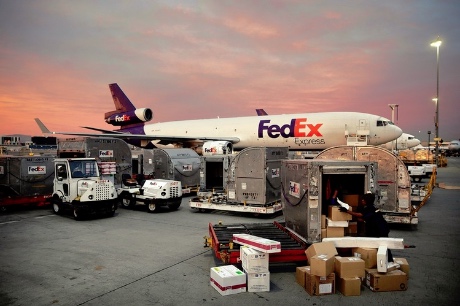I ordered a camera lens Monday night on Amazon.com. It was a pretty standard order. It’s not an expensive item. I didn’t pay a nickel extra for shipping. It’s pretty routine.
But this order reminds me how much our lives have improved — and how much we take those improvements for granted.
I got a shipment notification for the lens Wednesday morning. I had no idea where it was coming from. I didn’t care. But when I clicked a button in my email to track the FedEx package, a light bulb went off for me.
On the tracking page, I noticed the package was picked up by FedEx in Seongnam-si, South Korea — which is a satellite city near Seoul — at the end of the Wednesday business day there. Somehow, it will be delivered to me in Birmingham on Thursday.
An untold number of people are involved in getting my routine order fulfilled from the other side of the world all the way to me — and I never had to give a second thought to how any of it happens.
It’s a modern form of magic we call logistics.
How did it happen that this system exists — a system that gives me exactly what I want when I want it without any effort from me?
Did FedEx founder Fred Smith have me in mind when he dreamed up the idea for overnight delivery around the country? Of course not.
Did the various pioneers of the tech industry care about a transportation company’s need to communicate instantly around the world? No way.
Did the people who dreamed up the planes and trucks used to bring my package think about me? Nope.
These smart people were motivated by their own needs and desires. Some wanted the excitement of invention, but most wanted the personal profit that comes to those who meet the needs of others in a free market.
Fred Smith’s crazy idea for a package delivery company was a back-up plan after the U.S. Federal Reserve system declined to contract with him to haul checks and other banking documents around the country. It was a crazy idea. Few people gave him any chance of being successful. In desperation, he once gambled in Las Vegas to find immediate cash to keep going. He even had to keep his planes in the air at one point to stop them from being seized in Memphis by creditors.
But he and thousands of other eventual employees found a way to make it work. Early investors in the company took huge risks and then later investors took increasingly smaller risks. Eventually, we started taking overnight delivery for granted.
And now, we take quick delivery from anywhere in the world for granted — from FedEx and its various competitors.
None of these people went into business to make sure I got a lens from Korea quickly this week. They didn’t know I existed. They didn’t know I would ever want a lens right now.
They all wanted to make their own lives better through profit.
Some people today believe profit is a dirty word — they call it “greed” — but the profit motive is what has given us the advances that have made our lives so much better.
(It’s true that the technical foundations of the Internet were laid through research paid for by the U.S. government. I believe the same innovations would have happened without government involvement, but I don’t want to get sidetracked on that point.)
When you see planes in the air and big trucks on the road and thunderous diesel engines on train tracks, remember that all of this has been fueled by the desire of wealthy people to make a profit and smart people with ideas to get rich.
The combination of ideas and capital have brought us amazing things. They’ve brought us millions of jobs. They’ve brought us a luxurious lifestyle. They’ve brought us an insanely great selection of goods and services from around the world. All because “greedy” people wanted to make a buck — and change the world.
I’ll be happy to get my lens quickly all the way from Korea, but it would never have happened without brilliant and wealthy people guided by the desire to make a profit.
Economic freedom makes everybody better off. Profit drives the engine of prosperity.

 Goodbye, Charlotte (2009-2016)
Goodbye, Charlotte (2009-2016) Slow death of painful past leaves me trapped in fog of depression
Slow death of painful past leaves me trapped in fog of depression